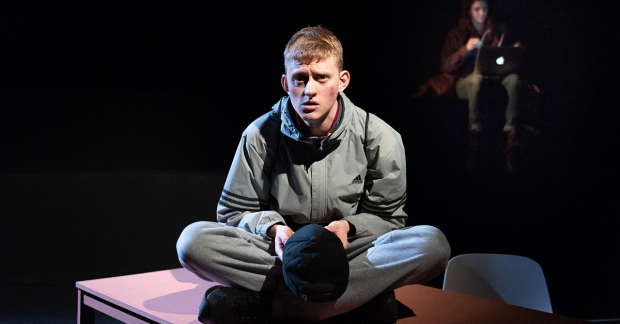Review: Mouthpiece (Soho Theatre)
Kieran Hurley’s play transfers to London after opening in Edinburgh last year

© Roberto Ricciuiti
Kieran Hurley makes theatre like a magic trick – spellbinding, full of misdirection, and blindsiding audiences with his final reveal.
Debuting last year at the Traverse Theatre, his 90-minute two-hander Mouthpiece explores the relationship between Libby, a self-described failed writer in Edinburgh with a penchant for artisanal food and avocado butties, and Declan, an unemployed late teen with a talent for art and living life on the edge of poverty. Forty-something Libby is fascinated by Declan, she wants to help him and, perhaps for self gain more than anything else, wants to write a play about him.
As Hurley has Libby point out in his script, it's basically the plot of Pulp's "Common People". Declan is, to some extent, an exercise in artistic exploration – a chance to see a different side of the Scottish capital, with a muse without the means to sustain himself. When the play she writes eventually premieres it is full of Declan's words, his life, but not his name. He is invisible even when his story is being told.
Staged at a deliberately jarring acute angle on Kai Fischer's tiered set, Orla O'Loughlin's production plays everything the way Hurley' s script demands, lithely going from naturalistic scenes to direct audience address – the fourth wall ending up another that Declan has to scale just to be heard.
There are two thoughtful performances from Lorn Macdonald as Declan and Neve McIntosh as Libby, McIntosh perfectly balancing the sense of affection her character has for the younger boy and the creeping worry that what she is doing is fundamentally wrong. Macdonald injects some fizzy humour into Declan, and his final speech brings the house down. Most importantly, both never let the piece's metatheatrical framing device prevent Libby and Declan being their own, tangible, relatable characters.
In its move from Edinburgh's Traverse to the Soho Theatre, the show has been sapped of some of its resonance (some of the production's final scenes are actually set in the Traverse) but it is hard to avoid its bite. This isn't the sort of self interrogation most playwrights would plum for – Hurley uses his final scenes to lay into the paying audience in the auditorium, tearing apart notions of an "authentic voice". How can you buy authenticity for fifteen quid a ticket?




















